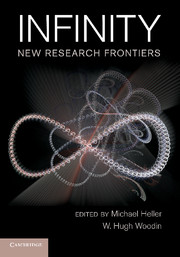Book contents
- Frontmatter
- Contents
- Contributors
- Preface
- Acknowledgments
- Introduction
- I Perspectives on Infinity from History
- II Perspectives on Infinity from Mathematics
- III Technical Perspectives on Infinity from Advanced Mathematics
- IV Perspectives on Infinity from Physics and Cosmology
- V Perspectives on Infinity from Philosophy and Theology
- Index
Introduction
Published online by Cambridge University Press: 07 June 2011
- Frontmatter
- Contents
- Contributors
- Preface
- Acknowledgments
- Introduction
- I Perspectives on Infinity from History
- II Perspectives on Infinity from Mathematics
- III Technical Perspectives on Infinity from Advanced Mathematics
- IV Perspectives on Infinity from Physics and Cosmology
- V Perspectives on Infinity from Philosophy and Theology
- Index
Summary
A stimulating factor in discussions of infinity is that the concept arises in many different contexts: mathematics, physics, metaphysics, theology, psychology, and even the arts. The founder of modern set theory, Georg Cantor, was well aware of these distinctions, and he collapses them into three domains.
The actual infinite arises in three contexts: first when it is realized in the most complete form, in a fully independent other-worldly being, in Deo, where I call it the Absolute Infinite or simply Absolute; second when it occurs in the contingent, created world; third when the mind grasps it in abstracto as a mathematical magnitude, number, or order type. I wish to make a sharp contrast between the Absolute and what I call the Transfinite, that is, the actual infinities of the last two sorts, which are clearly limited, subject to further increase, and thus related to the finite.
Mathematical infinities occur as, for instance, the number of points on a continuous line, the size of the endless natural number sequence 1, 2, 3,…, or the class of all sets.
In physics, we encounter infinities when we wonder if there might be infinitely many stars, if the universe might last forever, or if matter might be infinitely divisible.
In metaphysical discussions of the Absolute, we can ask whether an ultimate entity must be infinite, whether lesser things can be infinite as well, and how the infinite relates to our seemingly finite lives.
Information
- Type
- Chapter
- Information
- InfinityNew Research Frontiers, pp. 1 - 16Publisher: Cambridge University PressPrint publication year: 2011
